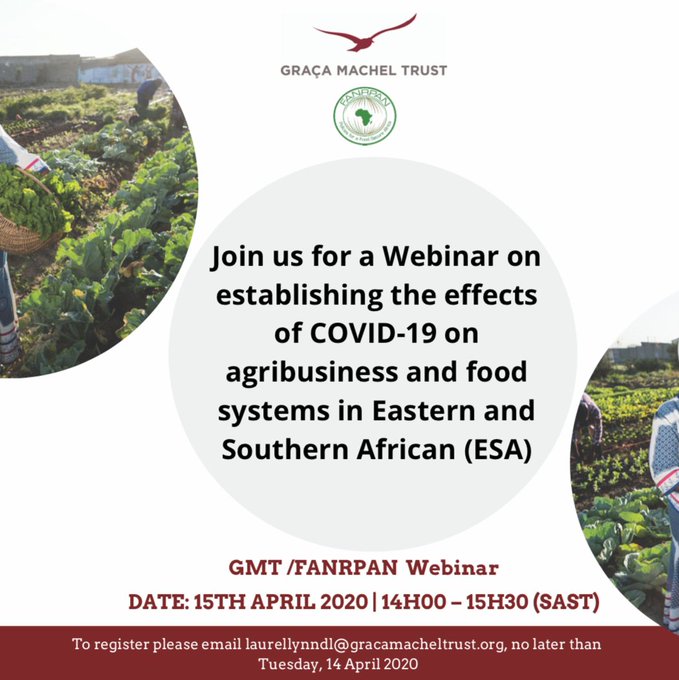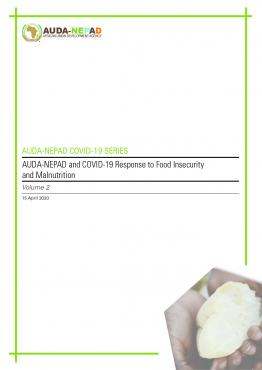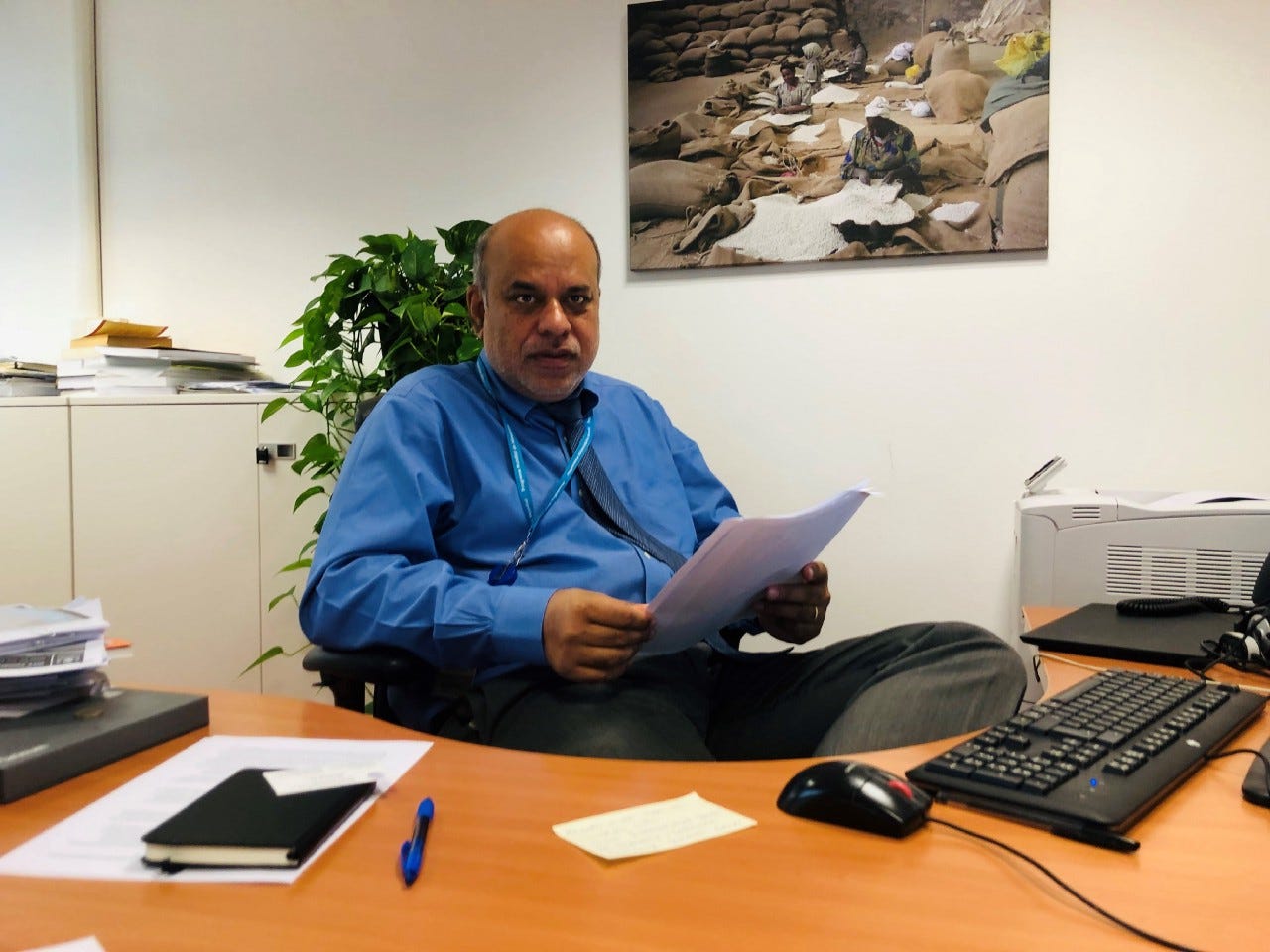26 March.
The Impact of COVID-19 on ARD and Food Security. Organised by CIMMYT/Agriculture and Rural Development (ARD) Working Group of the Scaling Up Community of Practice (CoP).
2 April.
COVID-19, food systems, and interaction with malnutrition. Organised by the Ad2Nut community and A4NH/IFPRI.
2 April. COVID19.
On-site measures for agricultural/forestry companies and sustainable landscapes operators. Including summary report in English, French and Spanish.
3 April.
The geopolitics of COVID-19 and climate change – the role of disruptors in the transformation to sustainability. Organised by Stockholm Environment Institute
7 April.
Launch of IFPRI's 2020 Global Food Policy Report: Building Inclusive Food Systems 14 April.
COVID-19: Implications for Global and Country-Level FNS and Poverty. Organised by IFPRI
9, 14, 16 April.
Post-COVID-19: Implications for International (Development) Cooperation (parts 1, 2, 3). Organised by UNDP Seoul Policy Centre (USPC).
14, 15 April.
Impact of current COVID-19 Crisis on the African financial sector. Making Finance Work for Africa (MFW4A) hosted two webinars on the impact of current health crisis on the African financial sector” in French and in English
15 April.
A Recipe for Disaster: Globalised food systems, structural inequality and COVID-19 WEBINAR. The Impact of COVID-19 on Water Resources
15 April.
The impact of the COVID-19 pandemic on Food Systems in the Eastern and Southern African Region. Organised by FANRPAN and the Graça Machel Trust (GMT) in conjunction with its African Women in Agribusiness Network. No recording available. Including 3 PPTs.
17 April - 21 May. International exchanges on post Covid-19 food systems. Webinar cycle in PORTUGUESE
17 April 2020.
COVID-19 Crisis – Implications for Food Systems in Developing Economies 21 April.
Coronavirus and Its Impact on the SDGs. Hosted by the International Association for Volunteer Effort.
21 April
. Protecting civilians from conflict induced hunger. Organised by the UN Security Council with Qu Dongyu, DG FAO; David Beasley, ED WFP; Jan Egeland, SC Norwegian Refugee Council.
22 April.
COVID-19 and the risk to food supply chains: How to respond? First FAO Brussels Dialogues. Máximo Torero FAO Chief Economist; Paolo De Castro European Parliament; Leonardo Mizzi, Head of Unit at EC, DEVCO. Includes the oral presentation. Including PPT of Torero. Report of this webinar forthcoming: questions left unanswered. Including Webinar of Food Tank with Torero.
22 April.
Africa: Confronting COVID-19. Co-hosted by ICAP at Columbia University and the Columbia Global Centers in Nairobi and Tunis.
22 April. COVID-19.
How Are Environmental and Health Crises Linked? Earth Day 2020. Including Webinar 07/04 on Learning from COVID-19 to fight climate change.
22 April 2020.
The impact of the COVID-19 pandemic on agricultural value chains. IFAD/VCBN. Including the summary report (6 pages) of the webinar
23 April 2020.
How agricultural/forestry companies and landscapes operators in Africa are responding to COVID19 Organised by IDH, FMO, Proparco and Mirova. The NASIRA financial program receives €25 million top-up from the European Fund for Sustainable Development
30 April 2020. FAO Zoominar II: Innovative success stories in the NENA region: Tool to support smallholders under COVID-19 disruptive impact?
Zoominar Recording and
Presentations 30 April.
COVID-19: Emerging problems and potential country-level responses Organised by IFPRI @ 2:00 pm GMT
30 April.
Effect of COVID-19 or Lockdown on Fertilizer Trade. Organized by AFAP
5 May.
The impact of the Covid-19 pandemic on agricultural value chains. VCB-N WEBINAR 2: - What we can do to mitigate the impact! – From a finance and corporate perspective
5 May.
Seed System Webinar on COVID-19 and Seed Security Response.
7 May 2020. FAO Zoominar III: Agri-Food Innovation Success Stories from outside NENA: Opportunities and Challenges Under COVID-19 Crisis.
Zoominar Recording and
Presentations
15 May 2020. Zoominar IV. Accelerating Digital Extension Advisory Services (DEAS) in post COVID-19 Context.
This webinar is part of a Series of webinars on the Food Systems Approach in Practice promoted by members of the One Planet Network Sustainable Food Systems Programme (SFS Programme), a global multi-stakeholder platform to support countries in the transition towards sustainable food systems.
26 May 2020. 3:30 AM CEST, 9:30 am – 11:15 am (Singapore), Webinar on
Food System Resilience - Global and Asian Perspectives. This webinar is one of a series organized by the
International Life Sciences Institute (ILSI) and its entities in Asia to share pertinent aspects and insights in science, food resilience, health research, and measures, as well as technological developments that can be harnessed to mitigate and address the longer-term impact of COVID-19. Speakers include Prof. Dr. Shenggan Fan.
26 May 2020. 11.00 AM - 12 PM CEST, 15.00 PM Hanoi, 16.00 PM Beijing. Webinar on
Sustainable Agriculture: Where Are We Headed After 2020? Speakers include: Alan Johnson, Program Lead - Smallholder Supply Chains,
IFC - International Finance Corporation; Leesa Shrader, Program Director,
Mercy Corps AgriFin Accelerate; Lucy Muchoki, CEO,
PanAAC - Pan African Agribusiness & Agroindustry Consortium
26 May 2020. 14:30 PM EAT (Nairobi). Webinar on
Urban Food Self Sufficiency LESSONS LEARNT FROM COVID-19 RESPONSES. Organised by
Food Rights Alliance and Partners with support from
OXFAM, HIVOS and Trocaire.
27 May 2020.11:00 AM - 12:30 PM CEST Webinar on
Sustaining food security and resilience in Africa in times of COVID-19. Organised by FAO/Brussels. Speakers: H.E. Josefa Sacko, Commissioner for Rural Economy and Agriculture, African Union (
AU), H.E. Georges Rebelo Pinto Chikoti, Secretary-General, Organisation of African, Caribbean and Pacific States (
OACPS), Marjeta Jager
Deputy Director-General, European Commission Directorate-General for International Cooperation and Development (
DG DEVCO), Laurent Thomas Deputy Director-General,
FAO; Abebe Haile-Gabriel
Assistant Director-General and Regional Representative for Africa,
FAO; Máximo Torero Cullen Assistant Director-General, Economic and Social Development,
FAO; Philippe Scholtès Managing Director, Directorate of Programme Development and Technical Cooperation, United Nations Industrial Development Organization (
UNIDO); Dominique Burgeon Director, Emergency and Rehabilitation,
FAO
27 May 2020. 14:30 - 16:00 PM CEST Climate Smart Agriculture- Loss of Biodiversity and the Uncertainties associated with Climate Change
03 June 2020. 8:00 pm, CEST. WEBINAR:
The Caribbean COVID-19 Food Security and Livelihoods Impact Survey
03-05 June 2020.
Digital Conference:
Food in the time of crises. This three-day event will continue to push the horizon of digital conferencing through interactive sessions, inspirational talks, documentary screenings and exclusive interviews streamed live from Bonn as well as landscapes and cities around the world. Participants will experience crowdsourced idea-sharing, networking to connect activities, digital scavenger hunts, learning journeys, live polls and more.
04 June 2020. CGIAR webinar series on climate security
4 June 2020. 13:00 PM CEST Webinar Covid 19: Learning to Build Resilience for Africa’s small scale farmers, food systems and sovereignty
4 June 2020. IMPACT OF COVID 19 ON ACCESS TO LAND JUSTICE
5 June 2020. 9:00 am EDT Webinar Food Systems Dashboard
Link to the Dashboard:
foodsystemsdashboard.orgThe Food Systems Dashboard is highly relevant to our community. It compiles data across the whole food system to assess & strengthen ag-nutrition linkages. In doing so, it brings together indicators from many diverse organizations/sources, which aligns with our CoP ethic of collaboration and breaking down institutional and sector boundaries.
10 June 2020.
One day online virtual interaction Youth in Agribusiness: Coping with COVID-19 in the context of a Changing Climate +
20 May 2020 to 5 June 2020.
Online discussion. The CGIAR Research Program on Climate Change, Agriculture and Food Security (
CCAFS),
IFDC-2SCALE, the Food and Agriculture Organization of the United Nations (UN-FAO), AgriProFocus, the Climate Smart Agriculture Youth Network (
CSAYN) and the Swedish International Agricultural Network Initiative (
SIANI) are hosting an online discussion on the Climate and Agriculture Network for Africa ( CANA ) platform.
11 June 2020.
Power and priorities: equitable partnerships in Agriculture, Nutrition and Health research. This webinar will dive into the challenges of equity in research partnerships tackling global agriculture, food systems and nutrition research.
15 June until 6 July, DAI and ECDPM will hold a series of webinars that will bring together public and private practitioners to reflect on the immediate reaction of the development community to the challenges posed by COVID-19, and support the post-pandemic global response of the European Union, as per its recent Communication. Calendar and topics of the weekly webinars
- 15 June: Strengthening MSMEs for economic resilience and sustainable development
- 22 June: COVID-19 and the accelerated digitalisation of developing countries’ economies
- 29 June: How Covid-19 calls for an alliance for financing
- 6 July: Building stronger health systems going forward
The webinars will be held on Monday from 3:00 pm to 4:15 pm
For more detailed information on the webinars and speakers,
please download the programme here.
To register, please fill this
form.






















